According to polls released by CNN and CBS, Trump led Biden by 4% and 3% respectively in case of a direct contest. If Trump, who faces 91 criminal charges across four cases, were to win next year’s US presidential election, he would take over the US Presidency at a time when the world is facing geopolitical turbulence – specifically the Russia-Ukraine conflict and the Israel-Palestine conflict. Trump has repeatedly stated that his rapport with Putin could have prevented a conflict between Russia and Ukraine. Furthermore, Trump has blamed Biden’s weak policy vis-à-vis Iran for being responsible for the Hamas attack on Israel.
A poll conducted by the New York Times and Siena College — earlier this month — found former US President Donald Trump leading over current incumbent Joe Biden in five key swing states – Arizona, Georgia, Michigan, Nevada, and Pennsylvania – in a hypothetical match-up in the 2024 presidential election. There are some other worrying signs for Biden according to this poll. First, the incumbent President is beginning to lose support among young and black voters. Second, despite Biden highlighting the success of his economic policies– referred to as ‘Bidenomics’ – and an improvement in economic indicators such as – nearly 5% GDP growth in the last quarter, a fall in CPI rate of inflation and unemployment – voters are pessimistic about the overall state of the US economy. Biden’s numbers are below those of Barack Obama and Trump at this point of the race. According to polls released by CNN and CBS, Trump led Biden by 4% and 3% respectively in case of a direct contest.
If Trump, who faces 91 criminal charges across four cases, were to win next year’s presidential election, he would take over the US Presidency at a time when the world is facing geopolitical turbulence – specifically the Russia-Ukraine conflict and the Middle East, especially in the context of the current Israel-Palestine conflict. While it is true, that there is one year to the election and it is tough to make forecasts regarding these conflicts, both of them are likely to have a strong impact on the global geopolitical landscape.
Also Read: China’s Perspective on the US Indo-Pacific Strategy: A Scholarly View
Trumpism in Russia-Ukraine Conflict
While commenting on the Russia-Ukraine war, Trump in a media interview in July 2023 said: “I know Zelenskyy very well, and I know Putin very well, even better…. I had a good relationship, very good with both of them. I would tell Zelenskyy, no more. You got to make a deal. I would tell Putin, if you don’t make a deal, we are going to give him a lot. We are going to [give Ukraine] more than they ever got if we have to.”
Trump has repeatedly stated that his rapport with Putin could have prevented a conflict between Russia and Ukraine. While many subscribe to this view, others find it too simplistic. Here it would be pertinent to point out, that John Mearsheimer, who belongs to the Realist School of International Relations and is known for his theory of offensive realism, has been arguing for a long, that US focus on the expansion of NATO is responsible for the current conflict. Another Republican Presidential candidate, Vivek Ganapathy Ramaswamy has been critical of the Biden Administration’s support for Ukraine and has a similar approach to the Russia-Ukraine conflict as Donald Trump.
John Mearsheimer, proponent of the theory of offensive realism, has been arguing that US focus on the expansion of NATO is responsible for the current Russia-Ukraine conflict.
Trump’s Middle East Policy
In the Middle East, Trump had been of the main architects of the Abraham Accord, which led to the normalisation of ties between four Arab countries – UAE, Bahrain, Morocco, Sudan – and Israel. Before the beginning of the current conflict, Saudi Arabia and Israel were heading towards normalization of ties. Both the Saudi Crown Prince, Mohammed Bin Salman and the Israeli PM, Benjamin Netanyahu had alluded to the same days before the beginning of the Israel-Palestine conflict. In the aftermath of the conflagration, this seems highly unlikely though Saudi Arabia has said that normalization with Israel is possible subject to a peaceful resolution to the Palestinian issue.
The Saudi Minister for Investment, Khalid bin Abdulaziz al-Falih while speaking at the recently held Bloomberg New Economy Forum in Singapore said: “This matter was on the table, and it is still on the table, and it is clear that the recent withdrawal (from the talks) explains why Saudi Arabia is so determined to make a solution to the Palestinian conflict part of broader normalization in [West Asia].”
It would also be important to mention here that ties between Gulf countries – especially Saudi Arabia – and Iran have improved. Tehran and Riyadh had agreed to resume diplomatic relations via a China-brokered agreement in March 2023. The Israel-Palestinian conflict has resulted in further strengthening of ties. Iranian President, Ebrahim Raisi who visited Riyadh to participate in a meeting of the Organization of Islamic Countries (OIC) and the League of Arab States on the Gaza conflict became the first Iranian President to visit Saudi Arabia in over a decade.
Another important point to bear in mind is that Beijing’s ties with both Iran and Gulf countries have grown significantly in recent years and China’s clout in the Middle East has risen significantly.
While Trump and other Republicans have criticised Biden’s Iran policy in the context of its failure to prevent Hamas attack on Israel, Biden has also lost his popularity amongst Arab-American voters.
Biden Administration’s Middle East Policy and the China factor
The Biden Administration has repeatedly asked China to use its leverage vis-a-vis Iran and prevent the current Israel-Palestine conflict from spreading. The former US President Trump, through his business interests in the Gulf, shares close ties with Saudi royals, especially the crown Prince Muhammed Bin Salman (MBS).
Significantly, Trump has blamed Biden’s weak policy vis-à-vis Iran for being responsible for the Hamas attack on Israel. The former US President in an interview last month, while referring to the release of $6 billion to Iran by the Biden administration in lieu of a prisoner exchange deal between the US and Iran commented: “Sadly, American taxpayer dollars helped fund these attacks, which many reports are saying came from the Biden Administration”
Other Republican policymakers have also criticised Biden’s decision. The Biden administration clarified that these funds were only released for humanitarian purposes. In the aftermath of the Hamas attack and the posture taken by Iran vis-à-vis the Israel-Palestine conflict, the Biden Administration has decided to block the usage of the $6 billion.
While Trump and other Republicans have criticised Biden’s Iran policy, he has also lost his popularity amongst Arab-American voters who believe that Biden could have done more to stop Israel’s bombing and siege of Gaza. Only 17% of Arab American voters said that they would vote for Biden compared to 59% in 2020.
Conclusion
In conclusion, it is too premature to make forecasts regarding the outcome of the 2024 US presidential election, but several countries would be paying close attention to the findings of the recent polls. While Donald Trump has been critical of Biden’s handling of complex geopolitical challenges, if he were to win in 2024 his work would be cut out.
Disclaimer: The views expressed in this article are of the author solely. TheRise.co.in neither endorses nor is responsible for them. Reproducing this content without permission is prohibited.
About the author
Tridivesh Singh Maini is a New Delhi-based Policy Analyst. He is faculty member of OP Jindal Global University, Sonepat, Haryana.

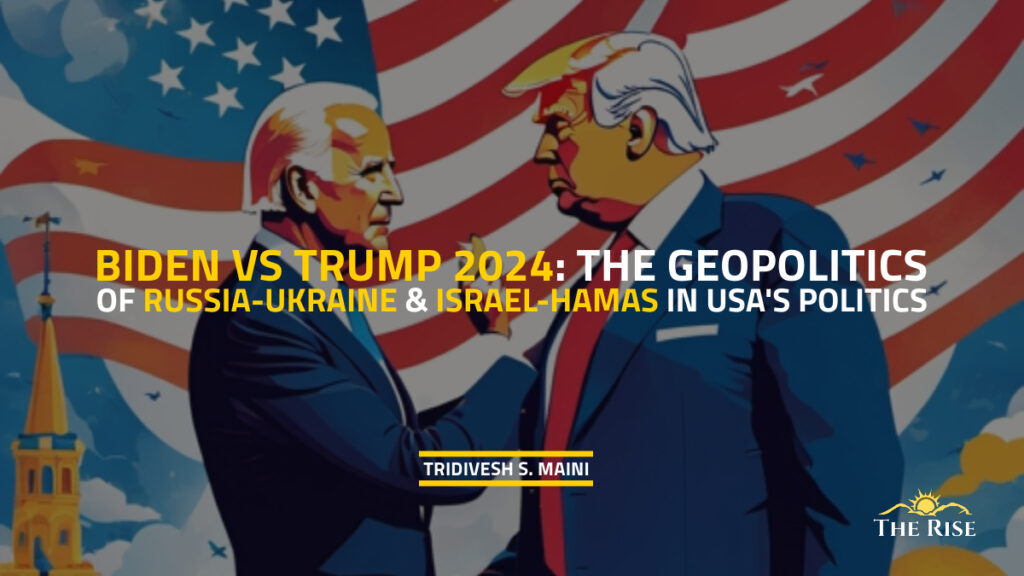

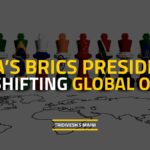

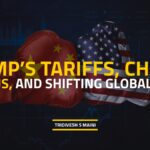







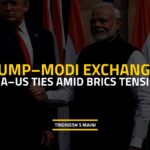























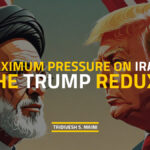









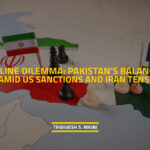


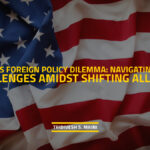
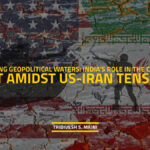
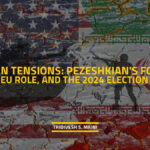



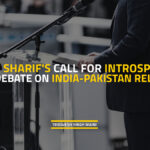

































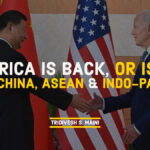


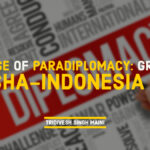



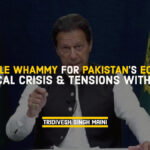

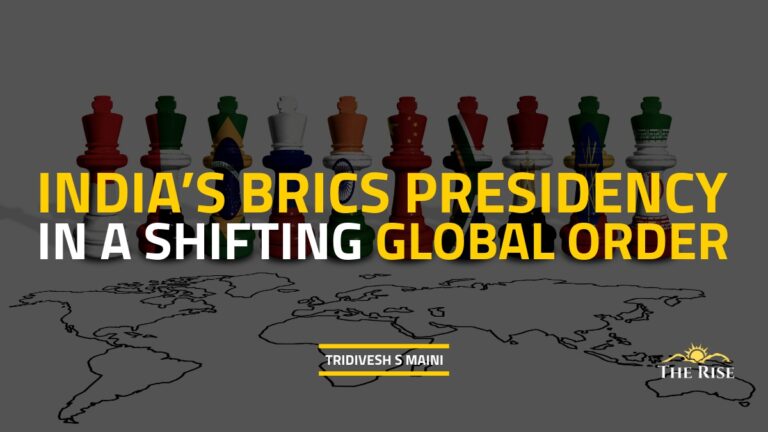



Pingback: Zelenskyy Visits Riyadh: Saudi's Deft Diplomacy